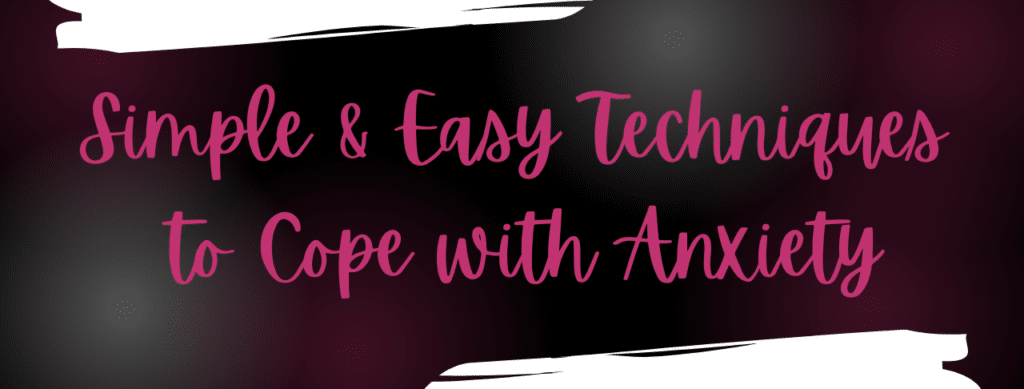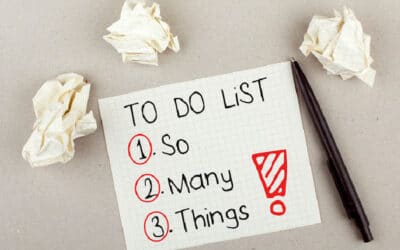At some point, each of us will experience anxiety. Everyone has anxiety from time to time, but chronic anxiety can interfere with your quality of life. While perhaps most recognized for behavioral changes, anxiety can also have serious consequences on your physical health. Recognizing that you are experiencing anxiety is the first healthy step toward learning how to manage and cope with your feelings.
Physical effects & symptoms of anxiety include:
- A sense of doom
- Depression
- Headaches
- Irritability
- Your heart is pounding for no good reason.
- Your mind is noisy, flitting from one thought to the next.
- You feel exhausted & extreme fatigue

What is Anxiety?
Anxiety isn’t stress but it can start there. It’s your mind and body’s reaction to stressful, dangerous, or unfamiliar situations. Anxiety usually manifests itself as an intense, excessive, and persistent worry and fear. A certain level of anxiety is normal. For example, you might feel uneasy, distressed, or even a feeling of dread a few moments before a significant event. Anxiety disorders are different.
When you’re living with an anxiety-based condition, the amount of worry and fear you feel might be completely debilitating. This is especially true when there’s no trigger for your anxiety. When this happens, anxious brains function in a constant state of worry and fear. Not knowing what to do, your brain releases an influx of stress hormones.
4 Major Effects of Anxiety On The Mind
#1. Anxiety Floods Your Mind with Stress Hormones
When you feel anxious, your body goes on alert, prompting your brain to prepare itself for flight or fight mode. In an attempt to help you fight off whatever has made you anxious, your brain floods your central nervous system with adrenaline and cortisol.
These hormones tell your body that something scary is about to happen. Their role is to help you cope with danger. In order to do that, they sharpen your senses and make your reflexes faster. In a non-anxious brain, when the danger is gone, the sympathetic part of your nervous system takes over and calms you down. But when you suffer from anxiety, you may not be able to reach that sense of calm. Instead, the rush of stress hormones causes your brain to release even more stress hormones until you’re simply overwhelmed.
When excess amounts of stress hormones flood the brain over and over again, your baseline level of anxiety may increase. You might go from having mild anxiety, which most of us experience on a day-to-day basis, to moderate anxiety.
Moderate anxiety is slightly more severe and overwhelming and makes you feel nervous and agitated on a regular basis. If your brain continues to be overly sensitive to anxiety, your baseline anxiety level might become so severe that you’re unable to continue thinking rationally. Panic attacks are another sign of severe anxiety.
#2. Anxiety Makes Your Mind & Brain Hyperactive to Threats
Anxiety can also make your brain hyperactive to threats. When you deal with anxiety on a consistent basis, your amygdala grows larger. The amygdala is a tiny almond-shaped structure located in the limbic system, the part of your brain that deals with emotions and moods.
The amygdala is like your brain’s watchman, staying on the lookout for any danger or threats. When the amygdala notices potential danger, it sends signals to the hypothalamus, which triggers a fight or flight response. In the anxious brain, the amygdala is large and hypersensitive. Because of this, the amygdala sends a lot of false alarms.
You can think of a hypersensitive amygdala as a watchman who cries wolf too often. An overactive amygdala sends false alarms so often that your brain senses threats even in non-threatening situations. That’s why people with anxiety disorders tend to feel threatened more often than someone without such a disorder.
#3. Anxiety Can Make It Hard for Your Mind to Reason Rationally
Anxiety weakens the connections between the amygdala and the prefrontal cortex (PFC). When the amygdala alerts the brain to danger, the prefrontal cortex should kick in and help you come up with a rational, logical response. The PFC ensures that you’re capable of processing information analytically and can make informed decisions, as well as helping you solve problems.
You can think of the PFC as your brain’s wise counselor. In non-anxious brains, the prefrontal cortex responds rationally when the amygdala sends out alerts. This process doesn’t work the same in anxious brains.
Instead, when the amygdala alerts the PFC to danger, the connection is weak. Thus the rational, problem-solving part of the brain isn’t heard, which can lead to irrational thoughts and erratic behavior.
#4. Anxiety Can Train Your Conscious Mind & Subconscious Mind to Hold onto Negative Memories
When you’re anxious, your body is under a lot of stress. Stress shrinks the hippocampus, the part of the brain that processes long-term and contextual memory. When the hippocampus shrinks, it may become more difficult for your brain to hold onto memories.
But here’s the tricky part: anxiety tricks the hippocampus into thinking that memories related to anxiety are safe to store and remember. So, the few memories you do hold onto will be those related to anxiety. In other words, anxiety wires your brain to remember failure, threat, and danger. Happier memories, like those of success, achievement, and safety, are buried deep in your subconscious.
Anxiety doesn’t have to take over your life. You don’t have to live in fear of the world or constantly worry about potential dangers.

Your Solution Starts Today!
I know how horrible anxiety can be on your life & body. That is why I have created my low cost, “Simple & Easy Anxiety Coping Techniques” 5 day workshop to get you started today!
This workshop is self-paced, all online and includes daily video instruction on how to use each technique, plus:
- Anxiety Coping Techniques Guide
- Anxiety Triggers Worksheet
- Breathing Exercises eBook
- My mini hypnosis session “Anxiety’s in the Bag”.
All this is yours to keep! For more information & to get started ➡ Anxiety Workshop
By implementing these coping techniques, breathing exercises and my support, you can begin learning how to manage your anxiety.
References: https://pronghornpsych.com/how-does-anxiety-affect-the-brain/






0 Comments